-
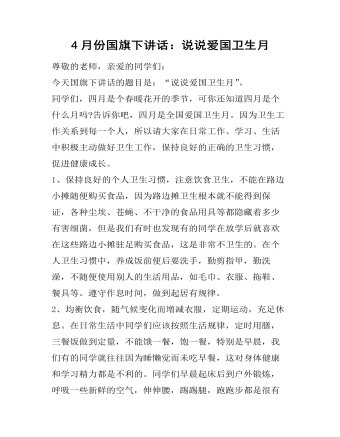
4月份国旗下讲话:说说爱国卫生月
尊敬的老师,亲爱的同学们:今天国旗下讲话的题目是:“说说爱国卫生月”。同学们,四月是个春暖花开的季节,可你还知道四月是个什么月吗?告诉你吧,四月是全国爱国卫生月。因为卫生工作关系到每一个人,所以请大家在日常工作、学习、生活中积极主动做好卫生工作,保持良好的正确的卫生习惯,促进健康成长。1、保持良好的个人卫生习惯,注意饮食卫生,不能在路边小摊随便购买食品,因为路边摊卫生根本就不能得到保证,各种尘埃、苍蝇、不干净的食品用具等都隐藏着多少有害细菌,但是我们有时也发现有的同学在放学后就喜欢在这些路边小摊驻足购买食品,这是非常不卫生的。在个人卫生习惯中,养成饭前便后要洗手,勤剪指甲,勤洗澡,不随便使用别人的生活用品,如毛巾、衣服、拖鞋、餐具等。遵守作息时间,做到起居有规律。2、均衡饮食,随气候变化而增减衣服,定期运动,充足休息。在日常生活中同学们应该按照生活规律,定时用膳,三餐饭做到定量,不能饿一餐,饱一餐,特别是早晨,我们有的同学就往往因为睡懒觉而未吃早餐,这对身体健康和学习精力都是不利的。同学们早晨起床后到户外锻炼,呼吸一些新鲜的空气,伸伸腰,踢踢腿,跑跑步都是很有好处的。

人教版高中语文必修1《小狗包弟》教案2篇
巴金在十年浩劫中的大致经历:放弃包弟并没有换得保全一家人,1968年8月,巴金被关进牛棚改造,随后经受了大字报、挂牌游街等形式的批斗。1970年,到农村改造,掏大粪、喂猪、背稻草、种地……1972年,妻子萧珊在饱受精神折磨后患上癌症,病逝。巴金的儿子在劳动改造的过程中也饱受精神和肉体上的折磨,性格变得内向抑郁,疾病缠身。此时,巴金69岁。巴金曾在《病中》一文写道:“当姚文元拿着棒子的时候,我给关在牛棚里除了唯唯诺诺之外,敢于做过什么事情?十年间我不过是一条含着眼泪等人宰割的牛。”小结:(幻灯片12)社会是病态的社会,政治是高压的政治,人性是扭曲的人性。十年文革,十年浩劫,给多少人留下了累累不可弥合的精神创伤。即使一条小狗,也可能摆脱不了“文革”无情的迫害,比如包弟,比如艺术家邻居的小狗。
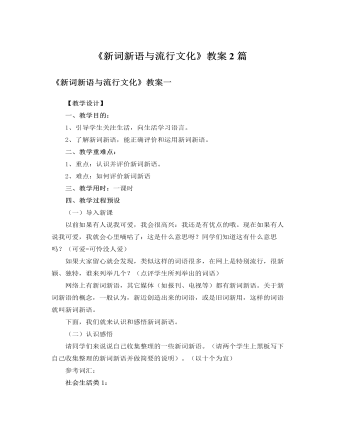
人教版高中语文必修1《新词新语与流行文化》教案2篇
【教学设计】一、教学目的:1、引导学生关注生活,向生活学习语言。2、了解新词新语,能正确评价和运用新词新语。二、教学重难点:1、重点:认识并评价新词新语。2、难点:如何评价新词新语三、教学用时:一课时四、教学过程预设(一)导入新课以前如果有人说我可爱,我会很高兴:我还是有优点的哦。现在如果有人说我可爱,我就会心里嘀咕了:这是什么意思呀?同学们知道这有什么意思吗?(可爱=可怜没人爱)如果大家留心就会发现,类似这样的词语很多,在网上是特别流行,很新颖、独特,谁来列举几个?(点评学生所列举出的词语)网络上有新词新语,其它媒体(如报刊、电视等)都有新词新语。关于新词新语的概念,一般认为,新近创造出来的词语,或是旧词新用,这样的词语就叫新词新语。
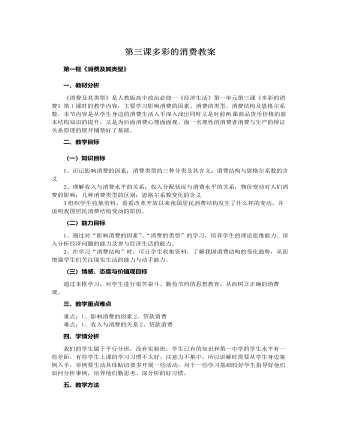
人教版高中政治必修1第三课多彩的消费教案
二、做理智的消费者1、量入为出,适度消费2、避免盲从,理性消费3、保护环境,绿色消费4、勤俭节约,艰苦奋斗十、教学反思本课的设计采用了课前下发预习学案,学生预习本节内容,找出自己迷惑的地方。课堂上师生主要解决重点、难点、疑点、考点、探究点以及学生学习过程中易忘、易混点等,最后进行当堂检测,课后进行延伸拓展,以达到提高课堂效率的目的。这节课我们主要学习了影响人们消费的几种消费心理和几种科学的消费观。本节课与学生生活十分贴近所以这节课充分的调动了学生学习的兴趣和积极性,并且让学生针对案例进行充分的分组讨论分析,通过学生的展示分析和补充可以知道学生们不但深层次分析了教学原理也透彻理解了教学重难点大大提高了课堂效率.。通过案例的分析进一步领会了教材原理突破了本节课的难点——树立正确的消费观。整堂课学生求知旺盛,复杂的知识变得简单化,从阅读教材到独立思考分析再到合作讨论最后的展示质疑答疑,加深了印象,提高了能力。
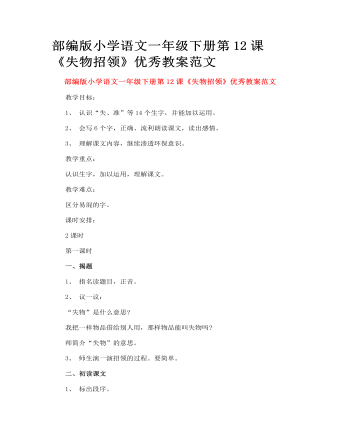
部编版小学语文一年级下册第12课《失物招领》优秀教案范文
读课文,感悟 1、 齐读第一自然段。 2、 你知道了什么时间什么人去干什么? 3、 植物园怎么样?同学们参观认真吗?你怎么知道的? 4、 指名读第一自然段,创设情境比比谁读得更棒。注意“可”要读出抑扬感。 5、 接下来的3、4、5、6自然段朗读,师读旁白,学生只要读说的一句话,但要结合叙述加进动作、表情等等。 6、 小组内练习,师巡视指导。 7、 各自读第7自然段,说说如果当时是自己在场会怎样想,怎样做。 8、 齐读第8自然段,师提示“会心的微笑”处要读得缓慢、高兴。 9、 讨论“会心的微笑”是什么意思,适当扩展。 10、 自荐读,比比谁读得更生动(从语音、语气、表情等方面评价)。 11、 各自读课文,要求: 完整、仔细,觉得有意思的地方多读读。努力读出自己的最佳样子。
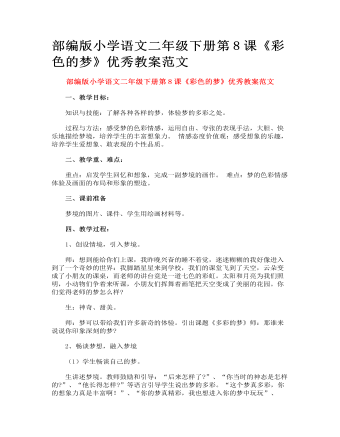
部编版小学语文二年级下册第8课《彩色的梦》优秀教案范文
创设情境,引入梦境。师:想到能给你们上课,我昨晚兴奋的睡不着觉,迷迷糊糊的我好像进入到了一个奇妙的世界:我脚踏星星来到学校,我们的课堂飞到了天空,云朵变成了小朋友的课桌,而老师的讲台竟是一道七色的彩虹。太阳和月亮为我们照明,小动物们争着来听课,小朋友们挥舞着画笔把天空变成了美丽的花园。你们觉得老师的梦怎么样?生:神奇、甜美。师:梦可以带给我们许多新奇的体验。引出课题《多彩的梦》师:那谁来说说你印象深刻的梦?
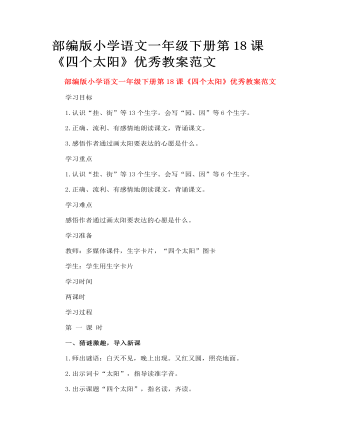
部编版小学语文一年级下册第18课《四个太阳》优秀教案范文
感悟理解,感情朗读 1.生再读课文后指名分自然段接读课文。 2.你们知道文中的小男孩分别为四季画了哪四个不同颜色的太阳吗?用“──”在文中划出。 3.指名发言,指导练读“绿绿的太阳”“金黄的太阳”“红红的太阳”“彩色的太阳” 师贴板画:“绿绿的太阳”“金黄的太阳”“红红的太阳”“彩色的太阳” 4.你最喜欢哪个季节的太阳呢? 同桌互读描写你最喜欢的那个季节的太阳的自然段 5.指名朗读,感悟理解 春天──多彩的太阳 1.指名读 2.指名再读,喜欢的齐读 3.你们看到的春天的色彩都有哪些? 4.师生合作读 夏天──绿绿的太阳 1.指名读 2.出示课件:高山、田野、街道、校园到处一片清凉。 指导朗读该句 3.男女生比读
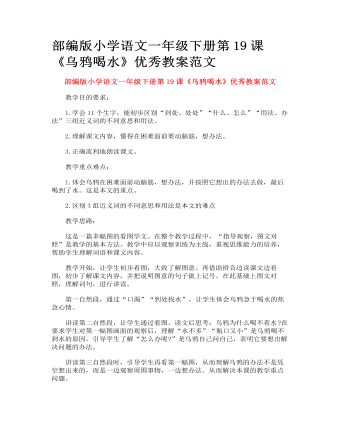
部编版小学语文一年级下册第19课《乌鸦喝水》优秀教案范文
教学思路: 这是一篇多幅图的看图学文。在整个教学过程中,“指导观察,图文对照”是教学的基本方法。教学中应以观察训练为主线,重视思维能力的培养,帮助学生理解词语和课文内容。 教学开始,让学生初步看图,大致了解图意。再借助拼音边读课文边看图,初步了解课文内容,并把说明图意的句子做上记号。在此基础上图文对照,理解词句,进行讲读。 第一自然段,通过“口渴”“到处找水”,让学生体会乌鸦急于喝水的焦急心情。 讲读第二自然段,让学生通过看图、读文后思考:乌鸦为什么喝不着水?在要求学生对第一幅图画面的观察后,理解“水不多”“瓶口又小”是乌鸦喝不到水的原因。引导学生了解“怎么办呢?”是乌鸦自己问自己,表明它要想出解决问题的办法。 讲读第三自然段时,引导学生再看第一幅图,从而理解乌鸦的办法不是凭空想出来的,而是一边观察周围事物,一边想办法。从而解决本课的教学重点问题。
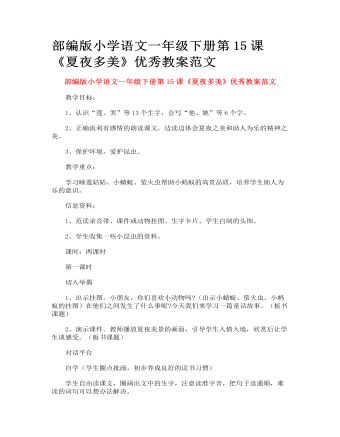
部编版小学语文一年级下册第15课《夏夜多美》优秀教案范文
1、检查读。教师以开火车的形式让学生按自然段读课文,看谁读得既正确又流利。 2、指正读。把你喜欢的小动物的话找出来读一读,教师随机指导。 3、想象读。先听范读录音,然后指名读文,边读边想象当时的情景。 4、分角色读。教师指导学生研究讨论每个角色的语气怎样读,并尝试给这些角色设计表情动作。 如:睡莲姑姑(奇怪的问):“小蚂蚁,你怎么了?” 小蚂蚁(揉肉眼睛,伤心的)说:“我不小心掉进池塘,上不了岸啦!” (让学生尝试添加提示语,是一个大胆的尝试。让学生根据生活经验和对课文的理解,给“人物”设计表情动作,添加不同的语气词,使课文变成了童话剧。由于是自己创造的成果,学生会读得有情有趣,有滋有味。但这种能力的培养不是一朝一夕的,教师要有意识的加以引导。)
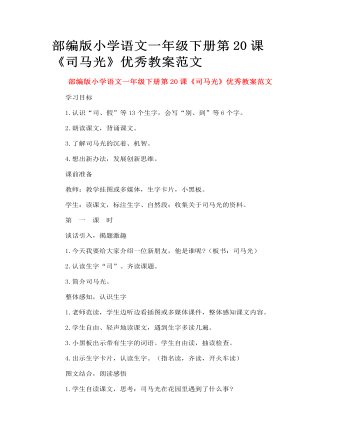
部编版小学语文一年级下册第20课《司马光》优秀教案范文
学习课文第一段。 (1)指名读,其他同学边听边想:这段主要讲的是谁?讲了他什么事?引导学生感知这段的主要内容。 (2)读第1句话,回答曹操是什么时候的人?理解“古时候”指三国时期,离现在大约有一千七百多年。 (3)读第2、3句,回答:人家送给他一头大象,他心情怎样?是怎样做的?(他很高兴,所以就带着官员和儿子去看象) (4)指导朗读。学习第二段 (1)指名读第2段,思考并回答:象是什么样子?官员们怎么做的?(使学生了解本段主要写了象又高又大,官员们边看边议论象的重量)。 (2)读第1句,看图回答:从哪地方看出象又高又大? 理解“身子像堵墙,腿像四根柱子”的意思,具体认识象的高大。 (3)再读课文,从中体会象很大。 (4)读第2句话,举例说说“议论”的意思,再回答:从官员们议论的话里你知道了什么?(象很重,官员们很想知道象有多重)。 再读这句话,读出官员们疑问语气。 (5)朗读第2段。
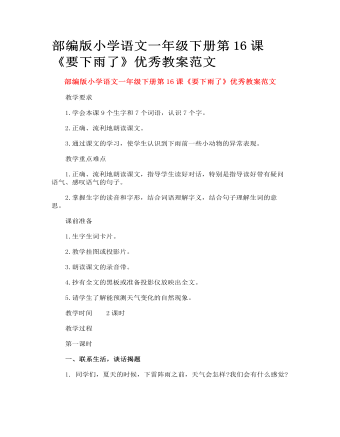
部编版小学语文一年级下册第16课《要下雨了》优秀教案范文
由扶到放,学习课文 1.指导学习一至三段。 (1)指名读第一段。学习生字"弯、直",通过做动作理解词义。 (2)练习朗读第一段,可边读边做动作。 (3)教师引读第二段:小燕子从他头上飞过。小白兔大声喊--(学生读)。 (4)引导学生看第一幅挂图:小燕子飞得很低,小白兔奇怪地向燕子为什么飞得这么低。学生练习朗读小白兔喊叫的句子,提醒学生注意提示语"大声喊"和句尾问号。 (5)先指名读第三段,然后逐句以问引读: ① 教师指第一句问:燕子边飞边说-- ②空气怎么样呢--(学生接读第二句)虫子的翅膀可比鸟的翅膀小多了,薄多了,就像透明的纱一样,沾上了小水珠,就像人背上了铅球一样沉重,自然就飞不高了。再读第二句。 ③那小燕子飞不高是什么原因呢?学生读最后一句,教师板书:捉虫子,学习生字"捉",练习朗读句子。
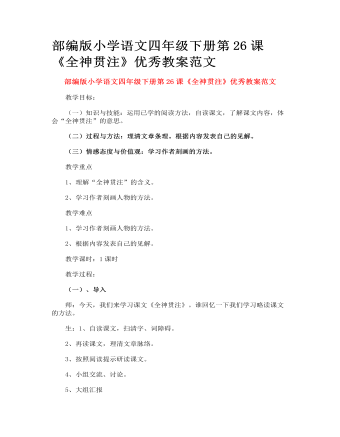
部编版小学语文四年级下册第26课《全神贯注》优秀教案范文
(一)、导入 师:今天,我们来学习课文《全神贯注》。谁回忆一下我们学习略读课文的方法。 生:1、自读课文,扫清字、词障碍。 2、再读课文,理清文章脉络。 3、按照阅读提示研读课文。 4、小组交流、讨论。 5、大组汇报 (二)、按照学习方法,进行学习。 (三)、(以小组为单位)汇报学习情况。 1、小组1:读课文,并讲解不理解的词义。 提醒易读错的字音和易写错的生字。
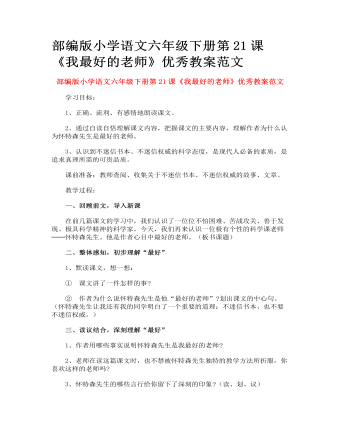
部编版小学语文六年级下册第21课《我最好的老师》优秀教案范文
嗅苹果 学生们向苏格拉底请教:怎样才能坚持真理? 笑容可掬的苏格拉底让大家坐下来,随后取出一个苹果。他用手指捏着,慢慢地从每个同学的座位旁边走过,一边走一边说:“请同学们集中精力,注意嗅一嗅空气中的气味。” 然后,他回到讲台上,把苹果举起来左右晃了晃,问:“哪位同学闻到了苹果的气味儿?” 有一位同学举手回答:“我闻到了,是香味!” 苏格拉底再次走下讲台,举着苹果,慢慢地从每一个学生的座位旁边走过,边走边叮嘱:“请同学务必集中精力,仔细嗅一嗅空气中的气味。” 稍停,苏格拉底第三次从讲台走到学生们中间,让每一个学生再嗅一嗅苹果的气味。
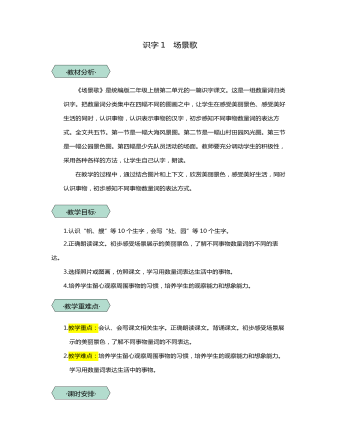
统编版二年级语文上识字1场景歌教学设计教案
《场景歌》是统编版二年级上册第二单元的一篇识字课文。这是一组数量词归类识字。把数量词分类集中在四幅不同的图画之中,让学生在感受美丽景色、感受美好生活的同时,认识事物,认识表示事物的汉字,初步感知不同事物数量词的表达方式。全文共五节。第一节是一幅大海风景图。第二节是一幅山村田园风光图。第三节是一幅公园景色图。第四幅是少先队员活动的场面。教师要充分调动学生的积极性,采用各种各样的方法,让学生自己认字,朗读。在教学的过程中,通过结合图片和上下文,欣赏美丽景色,感受美好生活,同时认识事物,初步感知不同事物数量词的表达方式。 1.认识“帆、艘”等10个生字,会写“处、园”等10个生字。2.正确朗读课文。初步感受场景展示的美丽景色,了解不同事物数量词的不同的表达。3.选择照片或图画,仿照课文,学习用数量词表达生活中的事物。4.培养学生留心观察周围事物的习惯,培养学生的观察能力和想象能力。 1.教学重点:会认、会写课文相关生字。正确朗读课文。背诵课文。初步感受场景展示的美丽景色,了解不同事物量词的不同表达。2.教学难点:培养学生留心观察周围事物的习惯,培养学生的观察能力和想象能力。学习用数量词表达生活中的事物。 2课时

新人教版高中英语必修3Unit 2 Morals and Virtues-Reading and Thinking教学设计
The topic of this part is “Learn to make choices in life”.The Listening & Speaking & Talking part aims at the moral dilemmas, and this part is about making choices in life. The heroin is Lin Qiaozhi, a famous medical scientist, made a great contribution to our country’s medical care. Most importantly, her life experience can inspire our students whether in studying or the development of career. she had moral dilemmas and life choices, which are similar to the students who will step into society. Besides, Lin has quite good virtues like kindness, self-improvement, insistence, job-loving , generosity and responsibility, which is worth being learned.Concretely, this article is a biography about Lin Qiaozhi. The article tells her whole life according the timeline, among which the life choices is emphasized. For example, whether married or chased her dream, returned home or stayed abroad, family or public, her choices all reflected her faith, spirit, responsibility and devotion.1. Fast reading to get the detailed information about Lin Qiaozhi; careful reading to do the deductive information.2. Learn the reading skills--deductive judgement according the context.3. Study the structure features and language features. 4. Communicate about Lin’s life choices and reflect their own life choices.1. Learn the reading skills--deductive judgement according the context.2. Study the structure features and language features.3. Communicate about Lin’s life choices and reflect their own life choices.Step 1 Lead in---Small talkWhat are some important life choices?Importance choices: university study, jobs and marriage partners. Because they can determine our future.

新人教版高中英语必修3Unit 3 Diverse Cultures-Discovering Useful Structure教学设计
Step 4 PracticeRead the conversation. Find out which words have been left out.Justin: Linlin, I’m going to Guizhou Province next month. I’m super excited! Any recommendations for places to visit?Linlin: Wow, cool! Guizhou is a province with a lot of cultural diversity. Places to visit...well, definitely the Huangguoshu Waterfall first.Justin: What’s special about the waterfall?Linlin: Well, have you ever heard of the Chinese novel Journey to the West ?Justin: Yes, I have. Why ?Linlin: In the back of the waterfall, you will find a cave, which is the home of the Monkey King.Justin: Really? Cool! I’ll definitely check it out.Linlin:And I strongly recommend the ethnic minority villages. You’ll find Chinese culture is much more diverse than you thought.Justin:Sounds great, thanks.Answers:Justin: Linlin, I’m going to Guizhou Province next month. I’m super excited! Do you have any recommendations for places to visit?Linlin: Wow, that’s cool! Guizhou is a province with a lot of cultural diversity. What are some places to visit in Guizhou ? Well, definitely the Huangguoshu Waterfall is the first place to visit in Guizhou Province.Justin: What’s special about the waterfall?Linlin: Well, have you ever heard of the Chinese novel Journey to the West ?Justin: Yes, I have heard of the Chinese novel Journey to the West . Why do you ask if I have heard of the Chinese novel Journey to the West?Linlin: In the back of the waterfall, you will find a cave, which is the home of the Monkey King from Journey to the West.Justin: That’s really true? It’s Cool! I’ll definitely check it out.Linlin:And I strongly recommend the ethnic minority villages on your trip to Guizhou Province. You’ll find Chinese culture is much more diverse than you thought it was.Justin:This all sounds great, thanks.

新人教版高中英语必修3Unit 3 Diverse Cultures-Listening &Speaking&Talking教学设计
1. In Picture 1 and Picture 2, where do you think they are from? How do you know?From their wearings, we can know they are from ethnic minority of China--- Miao and Dong.Picture 1, they are playing their traditional instrument lusheng in their traditional costumes.Picture 2. the girls are Miao because they wear their traditional costumes and silver accessory.2. In Picture 3, can you find which village it is? What time is it in the picture?It is Dong village. It is at night. Step 2 While-listeningJustin met a new friend while traveling in Guizhou. Listen to their conversation and complete the summaries below.Part 1Justin and Wu Yue watched some Miao people play the lusheng. The instrument has a history of over 3,000 years and it is even mentioned in the oldest collection of Chinese poetry. Then they watched the lusheng dance. Justin wanted to buy some hand-made silver/traditional accessories as souvenirs. He was told that the price will depend on the percentage of silver. Part 2They will go to a pretty Dong minority village called Zhaoxing. they will see the drum towers and the wind and rain bridges. They may also see a performance of the Grand Song of the Dong people.Step 3 Post-listening---TalkingWork in groups. Imagine Justin is telling some friends about his trip to Guizhou. One of you is Justin and the rest of you are his friends. Ask Justin questions about his trip and experience. The following expressions may help you.

新人教版高中英语必修3Unit 4 Space Exploration-Listening&Speaking&Talking教学设计一
Listening and Speaking introduces the topic of “talking about how to become an astronaut”. This period is aimed to inform students some details about the requirements of being an astronaut. Students can be motivated and inspired by the astronauts. Teachers ought to encourage students to learn from them and let them aim high and dream big.Listening and Talking introduces the theme of "talk about life in space". This part also informs students more details about life in space and can inspire students to be curious about this job. 1. Guide students to listen for numbers concerning dates, years and ages etc2. Cultivate students' ability to talk about how to become an astronaut and life in space ; 3. Instruct students to use functional sentences of the dialogue such as “ first of all, I am not sure, so what might be .. I guess.. I wonder…I am curious…)appropriately.1. Guide students to understand the content of listening texts in terms of the whole and key details; 2. Cultivate students' ability to guess the meaning of words in listening; discuss with their peers how to become a qualified astronaut and describe the life in space.Part 1: Listening and SpeakingStep 1: Lead inPredictionThe teacher can ask students to predict what the listening text is about by looking at the pictures.About how to become an astronaut./the requirements of an astronautStep 2: Then, play the radio which is about an interview a. And after finishing listening for the first time, the students need to solve the following tasks.

新人教版高中英语必修3Unit 4 Space Exploration-Reading For Writing教学设计一
另一方面,其余的人反对这个计划,因为它可能会导致一些不好的影响。7.I hold the belief that space exploration not only enable us to understand how the universe began but also help us survived well into the future.我坚信探索太空不仅能够使我们了解宇宙的起源而且能够帮助我们更好地走进未来。8.I think we should spend more time and money exploring space so as to provide new and better solutions to people's shortterm and longterm problems.为了给人类的短期和长期问题提供更新和更好的解决方法,我认为我们应该花更多的时间和金钱来探索太空。9.From my point of view,it is wrong of young people to depend on their telephones too much,which may do harm to both their physical and mental health.在我看来,年轻人过度依赖手机是不对的,因为它们可能会对他们的身心健康都有害。最近你班同学就“人类是否应该进行宇宙探索”这个问题进行了激烈的讨论。有人认为,探索宇宙不仅让人类更好地了解宇宙的发展,还可以用来指导农业生产,以及把一些探索太空的高新技术用于现实生活;也有一些人认为探索太空花掉了大量的人力物力;影响了人们的生活水平。请你根据以下情况写一篇报告并发表自己的观点。注意:1.写作内容应包括以上全部要点,可适当发挥,使上下文连贯;

新人教版高中英语必修3Unit 5 The value of money-Reading and Thinking教学设计二
? Could you offer me some kind of work here?? I don’t want your charity, I just want an honest job.? Careless: I landed in Britain by accident.Step 7:Consolidation.? Find Henry? Roderick and Oliver were I .making a bet when they saw Henry, a poor young man. ? Know Henry? About a month ago, Henry was sailing and later he found himself carried out to sea by a strong wind. Fortunately, he 2.was spotted by a ship. And it was the ship that brought him to 3.England? Offer money to Henry ? Oliver and Roderick gave Henry a letter and told him that there was money in it. They 4.persuaded him to accept it, and made him 5.promise that it wouldn't be opened until 2 o'clock.Step 8:Language pointsa large amount of: a large quantity of; a great deal ofe.g. They bought a large amount of furniture before they moved their new house.make a bet: make an arrangement to risk money, etc. on an event of which the result is doubtful.e.g. We made a bet on the result of the match.permit sb to do something: allow somebody to do somethinge.g. My mother doesn’t permit me to ride in the street after it rained.by accident: as a result of chancee.g. I only found it by accident.stare at: look at somebody or something with the eyes wide open in a fixed gaze( in astonishment, wonder, fear, etc)to be honest: to tell you the truth; to be franke.g. To be honest, I don’t think we have a chance of winning.Step7 Homework:What do you think will happen to Henry? Will the bank-note help him or get him into trouble?

